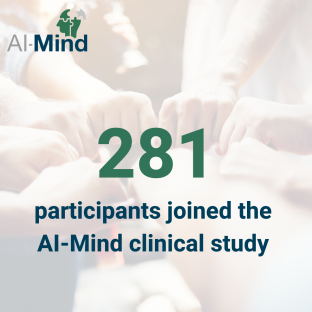The AI-Mind consortium recently reached a significant milestone with the recruitment of the 250th research participant in its clinical study. This clinical study is a key part of the AI-Mind project and will help develop and validate artificial intelligence (AI)-based tools to predict who is likely to develop dementia. The AI-Mind Connector will identify dysfunctional brain networks in an automated manner, and the AI-Mind Predictor will assess dementia risk using data from the Connector, enriched with information collected through advanced cognitive tests, and genetic biomarkers.
Out of a total of 1,000 expected participants with mild cognitive impairment (MCI), aged between 60 and 80 years, 281 research participants (as of 1 June 2022) have already been recruited in five European clinical centres:
• Complutense University of Madrid (UCM, Madrid, Spain)
• Helsinki University Hospital (HUS, Helsinki, Finland)
• Oslo University Hospital (OUS, Oslo, Norway)
• The Catholic University of Sacred Heart (UCSC, Roma, Italy)
• San Raffaele Roma (IRCCS, Roma, Italy).
Moreover, this achievement was recently followed by more positive news shared by Prof. Camillo Marra from UCSC at the 4th AI-Mind General Assembly that took place in Rome. With the first participant included in January 2022 there is a positive trend of increasing interest in the study and the numbers of recruited participants. People interested in the study can learn more about it from dedicated sections on the AI-Mind website, as well as watch an explanatory video developed to inform potential participants about the AI-Mind study procedures. With the goal to distinguish people at risk and not at risk of dementia in a group of mild cognitive impairment subjects, the AI-based platform with both tools, AI-Mind Connector and AI-Mind Predictor, will be tested and validated in the above European clinical centers.
This project has received funding from the European Union’s Horizon 2020 research and innovation programme under grant agreement No 964220.
